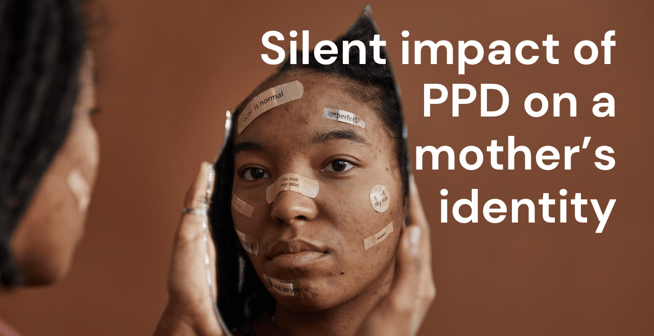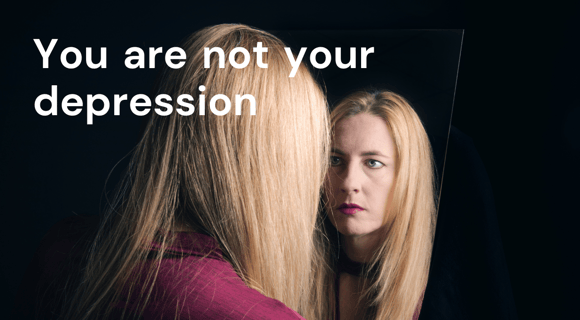How Postpartum Depression Affects a New Mother’s Identity
7/1/20255 min read
The Silent Identity Crisis of Motherhood: Understanding the Impact of Postpartum Depression
Motherhood is often portrayed as a profound transformation—a sacred evolution marked by unconditional love, selfless sacrifice, and a deep sense of purpose. But for many women, this transformation doesn’t arrive as expected. Instead, it comes shrouded in emotional exhaustion, self-doubt, and a disorienting sense of disconnect from both who they once were and who they believe they’re supposed to become.
This is the often-overlooked reality of postpartum depression (PPD)—a condition that not only affects mood and behaviour but quietly reshapes a mother’s very sense of self.
While clinical symptoms of PPD—such as persistent sadness, anxiety, and insomnia—rightfully receive medical attention, the identity crisis that often accompanies it is less discussed. And yet, it can be just as devastating. The erosion of self can happen gradually or all at once, subtly dimming a woman’s inner world until she no longer recognizes the person in the mirror.
At Peace Temple, we hear it time and time again from the mothers we serve:
“I don’t recognize myself anymore.”
“I thought I’d feel like a mom, but instead I feel like a shell.”
These aren’t fleeting thoughts. They are the echoes of a self in distress—an identity unravelling under the weight of unmet expectations and unspoken struggles. And they deserve not just compassion, but real attention and support.


The Myth of Instant Transformation
Our cultural script about motherhood tends to be idealistic: the moment a woman gives birth, she’s “reborn” as a mother, complete with instincts, wisdom, and unconditional joy. This myth leaves little room for uncertainty, ambivalence, or distress.
But in reality, identity doesn't snap into place the moment the baby arrives. Instead, it evolves slowly—and sometimes painfully—through trial, error, love, and loss. When PPD is part of that transition, the identity shift can feel like a fracture instead of a formation.
PPD and the Fracturing of Self
Postpartum depression alters the way a mother thinks, feels, and even perceives herself. This can result in an identity that feels broken, disconnected, or unrecognizable.
1. Loss of the “Old Self”
Many mothers report mourning the person they were before pregnancy—someone with hobbies, career ambitions, spontaneity, or even just mental clarity. PPD exaggerates this loss, making it feel as if that self is gone forever.
“I used to be confident, social, put-together,” one mother shared at Peace Temple. “Now I feel like a ghost in my own life.”
2. Uncertainty About the “New Self”
Becoming a mother brings expectations—both internal and external. When PPD clouds the transition, many women wonder: Am I even cut out for this? The lack of joy, connection, or purpose can feel like evidence that they’re failing in this new role.
This conflict creates a crisis of identity, where neither the old nor the new self feels accessible or valid.
3. Distorted Self-Perception
PPD affects cognitive patterns, often leading to negative self-talk and distorted self-image:
“I’m not a good mother.”
“My baby deserves better.”
“I don’t matter anymore.”
These thoughts can become core beliefs if not addressed, fundamentally reshaping how a mother sees herself, not just as a parent, but as a person.


The Role of Guilt and Shame
One of the most corrosive effects of PPD on identity is the internalization of guilt and shame. Mothers often feel guilty for not loving motherhood, for not bonding instantly, or for longing for their old life.
This guilt quickly mutates into shame: not just “I did something wrong”, but “There’s something wrong with me.” Shame isolates. It silences. And it erodes identity from the inside out.
At Peace Temple, we work to untangle shame from identity. You are not your depression. You are not broken. You are navigating something immensely difficult—and you deserve support, not judgment.
Identity Strain in Roles and Relationships
PPD doesn't just impact how a woman sees herself—it changes how she shows up in her relationships and responsibilities, often causing tension or confusion in her social world.
- As a Partner
Many new mothers struggle to maintain intimacy or communication with their partner. They may feel disconnected, resentful, or unworthy. This can strain the couple’s bond and challenge a woman’s sense of herself as a spouse or romantic partner.
- As a Friend or Professional
A mother coping with PPD may pull back from friendships, professional pursuits, or hobbies. Not from disinterest, but because energy and clarity are in short supply. Over time, this withdrawal can lead to the feeling that she has "disappeared" from the world she once belonged to.
- As a Daughter, Sister, or Community Member
Family and cultural expectations can further complicate the picture. If the women around her seemed to thrive postpartum, she may feel even more alienated. Identity is not created in a vacuum—it’s relational, and when those relationships feel strained or misunderstood, the identity crisis deepens.
The Path to Reclaiming Identity
Rebuilding a sense of self after or during PPD is not about returning to the old self—it’s about integrating the experience and emerging with a more compassionate, resilient identity. Here’s how that healing often begins:
1. Acknowledging the Grief
It’s okay to grieve the person you were before. It’s also okay to admit that motherhood hasn’t unfolded the way you imagined. Grief is not ingratitude—it’s the emotional processing of transition.
At Peace Temple, we hold space for mothers to explore these complex feelings without judgment.
2. Separating the Self From the Symptoms
PPD can feel like a personality change—but it’s a temporary state, not a permanent trait. Therapy can help mothers disentangle their identity from their illness and begin to reconnect with their core values and strengths.
3. Reconnecting With Personal Values
Part of rebuilding identity is rediscovering the things that matter most: creativity, purpose, autonomy, connection. Even in small doses—writing a poem, walking alone, laughing with a friend—these moments remind mothers of who they are beyond the role of “mom.”
4. Challenging Internalized Narratives
One of the most powerful steps in reclaiming identity is rewriting the story. Instead of “I failed,” the narrative becomes, “I survived.” Instead of “I lost myself,” it becomes, “I’m rebuilding myself with more depth and understanding.”
Our therapists at Peace Temple specialize in this kind of narrative reframing—because identity isn’t just what happens to us; it’s the meaning we make from it.
Final Thoughts: You’re Still You—Even If You Can’t Feel It Yet
Postpartum depression is not just a medical condition. It’s a disruption of the self. A redefinition. A reckoning.
But it’s also an invitation—to reimagine what it means to be a mother, a woman, and a person who has walked through the fog and come out with a softer, stronger voice.
At Peace Temple, we’re here to help you remember that you are still in there—beneath the layers of fatigue, fear, and disconnection. And your identity isn’t gone. It’s evolving.
You’re not lost. You’re becoming.
